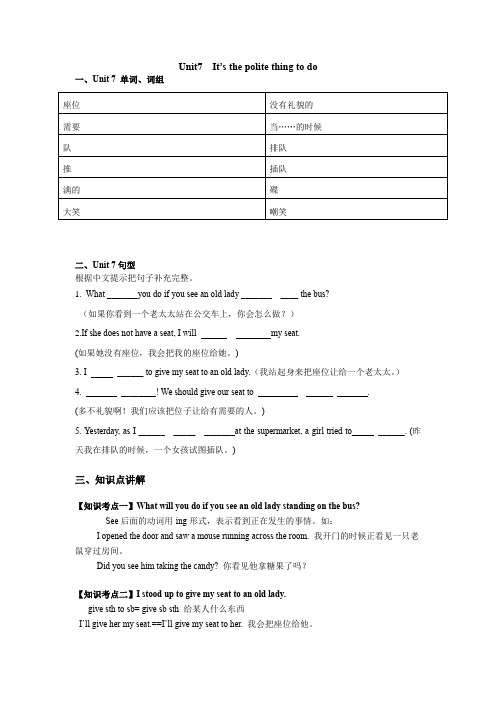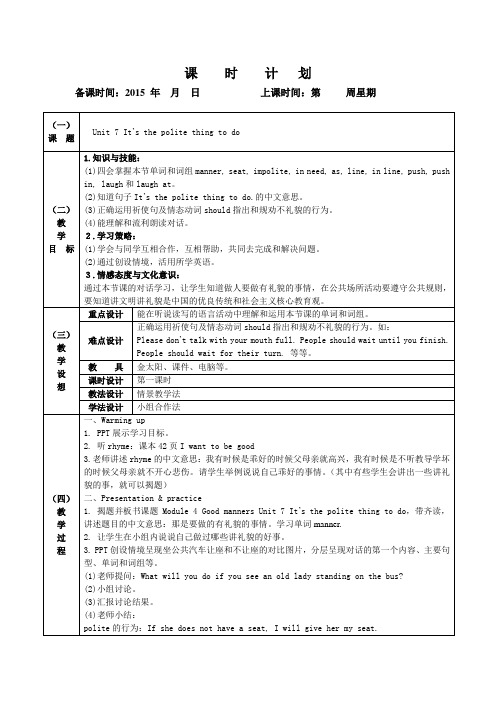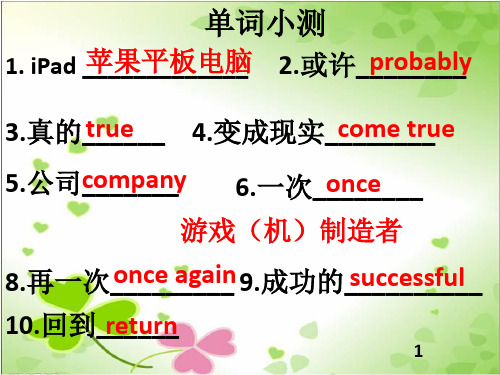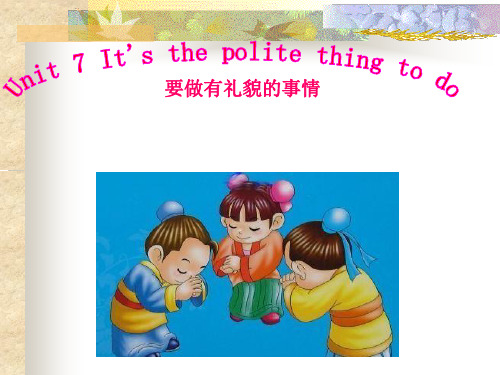新版广州六下U7It’s the polite thing to do
- 格式:docx
- 大小:59.83 KB
- 文档页数:4

Unit7 It’s the polite thing to do一、Unit 7 单词、词组二、Unit 7句型根据中文提示把句子补充完整。
1.What _______you do if you see an old lady _______ ____ the bus?(如果你看到一个老太太站在公交车上,你会怎么做?)2.If she does not have a seat, I will my seat.(如果她没有座位,我会把我的座位给她。
)3. I ______ to give my seat to an old lady.(我站起身来把座位让给一个老太太。
)4. _____ _! We should give our seat to .(多不礼貌啊!我们应该把位子让给有需要的人。
)5. Yesterday, as I ______ _____ _______at the supermarket, a girl tried to ______. (昨天我在排队的时候,一个女孩试图插队。
)三、知识点讲解【知识考点一】What will you do if you see an old lady standing on the bus?See后面的动词用-ing形式,表示看到正在发生的事情。
如:I opened the door and saw a mouse running across the room. 我开门的时候正看见一只老鼠穿过房间。
Did you see him taking the candy? 你看见他拿糖果了吗?【知识考点二】I stood up to give my seat to an old lady.give sth to sb= give sb sth 给某人什么东西I’ll give her my seat.==I’ll give my seat to her. 我会把座位给他。



广州教科版六年级下册英语目标短语目标句型1.我会给她让座。
______________________________________________ 2.多不礼貌啊!_____________________________________________________ 3. 我们应该把座位让给有需要的人。
_____________________________________________________ 4.这是礼貌的做法。
_____________________________________________________ 5.人们应该排队等待着轮到自己。
_____________________________________________________2. give sb.sth.= give sth.to sb.给某人某物注意:跟在动词或介词后作宾语的人称代词要用宾格。
例: Please give me a ruler. =Please give a ruler to me.归纳:主格I you he she it you they we宾格me you him her it you them us 3. wait until.意为“等到....”, until意为“直到…”。
例: Don't talk with your mouth full. Wait until you finish eating.My father worked until ten o’clock in the evening.4.What will you do if you see an old lady standing on the bus?询问对方在某种条件下将会做什么的句型“ What will you do if…?”。
what是疑问词,意为“什么”。
will意为“将;会”,常用于表示一般将来时的句子中。


U7 拓展语法形容词和副词形容词一、定义:用来形容人或事物特点的词。
二、形容词的作用:1、形容词作定语(1)大多数形容词作定语修饰名词时,其位置在被修饰的名词前,说明名词的品质或特征。
She is a tall girl. 她是一个高个子女孩。
It’s a black and white cat. 它是一只黑白色相间的猫。
He is a good teacher. 他是一名好老师。
She is wearing a green coat. 她穿着一件绿外套。
(2)但在下列情况下,形容词却放在它所修饰的名词之后。
当被修饰的词是不定代词somebody, someone, something, anybody, anyone, anything, nobody, nothing等复合不定代词的形容词,作定语时要后置。
I would like something cheap. 我想要点便宜的东西。
There is nothing wrong with him. 他没有错。
Is there anything new in that book? 那本书里有什么新东西吗?(3)enough等形容词修饰名词时可前置或后置。
We have enough time/ time enough. 我们有足够的时间。
(注:形/副+ enough,此时enough 必须后置)2、形容词作表语形容词作表语,常位于连系动词be(am, is, are), become, get, turn, look, keep, seem等词的后面,说明主语的特征、状态或身份。
The food is delicious.这种食物美味可口。
The story is very interesting.这个故事很有趣。
Generally speaking, it is cold in the north, it is warm in the south.一般来说,北方天气冷,南方天气暖和。
Module 4 Good mannersUnit7 It`s the polite thing to doArticle一、教学背景介绍:已经在开学的第1-2周把所有单词教授完毕。
让学生能理解单词的含义,能根据发音规则正确读单词。
第4周把短语教授完毕,学生能初步朗读课文。
本次课程是U7的第二课时,课前已经布置学生进行课文预习。
二、教学目标:1、情感态度与价值观:通过本课学习增强学生对英语学习兴趣的培养,了解什么是有礼貌的事情,知道怎么去帮助别人和懂得感恩。
2、过程和方法:通过对话、表演、观看短片等活动,让学生更好地理解文章。
3、知识和能力:提高口语交际能力,增强学习兴趣。
三、教学重点:熟读全文,能理解课文含义,通过观看短片感化学生。
四、教学难点:灵活自如地进行角色扮演、运用语言。
五、课前准备:教师:电脑、光盘、投影仪、角色扮演的道具。
学生:预习课文。
六、教学设计:1、课前检查。
①课前5分钟读单词短语U4&U7。
学生齐声读单词,英文2遍,中文1遍。
②听写,检查学生单词短语背诵情况。
2、熟读课文。
①听读课文。
第一遍学生听读:小动画播放(光盘)a.合上书,注意录音朗读文章的节奏、停顿及意义重音。
b. 回答问题How many impolite thing in this dialogue? (PPT展示问题)第二遍学生听读:小动画播放(光盘)a.带着问题听录音。
1、What will you do if you see an old lady standing on the bus?2、Should we give our seat to people in need? Why?3、Should the people always wait for their turn?b. 请同学回答问题。
第三遍学生听读:小动画播放(光盘)a.翻开书听录音,注意录音朗读文章的节奏、停顿及意义重音。
第四遍学生试读:小动画播放(光盘)a.学生试跟读录音。
Unit 7 It’s the polite thing to doFocus PointsLet’s TalkTalk about what’s the polite things we should do more.Warming Up听写__________________________________________________________________________________ __________________________________________________________________________________ __________________________________________________________________________________ __________________________________________________________________________________ __________________________________________________________________________________ __________________________________________________________________________________ 二.单词及短语1.礼貌_______________________2. 座位_______________________3.没有礼貌的_________________4. 需要(的时候)________________5.当......的时候________________6. 排队_______________________7.插队_______________________8. 满的_______________________9. 盘子;碟子_________________ 10. 大笑______________________11.嘲笑______________________ 12. 随便吃点__________________ 13.扔;掉____________________ 14. 坐下______________________ 15. 排队等候__________________ 16. 分享______________________ 三.课文内容根据提示把句子补充完整。
六年级下册英语教案-Module 4 Good manners Unit 7 It’s the polite thing to do 教科版(广州)教学目标1.掌握并正确使用下列词汇:polite, manner, behave, seats, gift, thanks, sorry, excuse me。
2.通过本单元学习,了解中西方文化差异,了解礼仪习惯。
3.能够在日常生活中应用所学礼仪习惯。
教学重点1.掌握并使用本单元所学词汇。
2.了解礼仪习惯及文化差异。
3.能够正确应用所学礼仪习惯。
教学难点了解文化差异对礼仪习惯的影响。
教学准备课件、PPT、英汉词典。
教学过程Step 1自我介绍1.老师介绍自己并要求学生轮流介绍自己并说出自己的爱好和喜欢的食物等。
Step 2词汇练习1.引导学生学习本单元中的词汇并进行课堂练习。
Step 3 观看视频1.教师播放视频,介绍日常生活中应用礼仪习惯的场景,例如礼貌的用语、坐姿等。
Step 4 分组讨论1.将学生分为小组,让他们通过讨论分析中西方文化差异所带来的礼仪习惯上的差异。
老师引导学生思考并提出问题、分析现象。
Step 5 个人表述1.每组挑选一名代表,向全班展示该组的讨论成果。
Step 6 模仿1.教师将不同的情景写在黑板上,例如“感谢别人的礼物”、“打招呼”等,让学生模仿场景中的情景,通过语音或身体语言展现出其中的礼仪习惯。
Step 7 家庭作业1.让学生回家观察自己的生活,找到并记录自己使用礼仪习惯的情景。
总结本单元的教学主要是教育学生从小事做起,从日常和生活中进行着手,使学生体会到礼仪习惯的重要性,培养良好的社会行为和约定俗成的行为规范,让学生成为懂礼貌、讲文明、守秩序的好少年。
Unit 7 It’s the polite thing to do----by Miss Wu要点一,巩固单词(拼读法)manner n. [mænə]seat n. [si:t]impolite adj. [ɪmpəlaɪt]in need [in, ni:d]as conj.[æz]line n.[lain]in linepush v. [puʃ]push infull adj. [ful]laugh v.[la:f]laugh at随堂练习(根据中文意思写出单词)1.方法,态度,礼貌2.座位3.没有礼貌的4.需要(的时候)5.当……的时候6.队7.排队8.推9.插队10.满的11.大笑12.嘲笑要点二,理解课文Jiamin: Hey, Ben! What will you do if you see an old lady standing on the bus?Ben: That’s easy. If she does not have a seat, I will give her my seat. Why?Jiamin: Well, today on the bus, I stood up to give my seat to an old lady. But before I could say anything to her, a young man quickly sat down.Ben: How impolite! We should always give our seat to people in need. It’s the polite thing to do.Xiaoling: That’s right. I don’t like impolite people. Yesterday, as I waited in line at the supermarket, a girl tried to push in. she didn’t even say “ Excuse me”.Janet: People should always wait for their turn,if the line is long, don’t push in. Be patient!理解要点:1、分析句子所用的时态。
2、分析划线单词或词组的用法。
3、口译对话。
语法点分析:1.We should be quiet when the teacher is talking.2.We shouldn’t play in class when the teacher is talking.3.You should wait until you finish.4.You shouldn’t talk with your mouth full.5.You should share with others.6.You shouldn’t take all the food from the dish.7.We should be kind.8.We shouldn’t laugh at another pupil.要点三,小升初专题之词性变化(一)真题2011年大联盟第四大题四.用动词的适当形式填空。
1. My father _______(like)________(play) baseball.2. He__________(visit) the farm next week.3. Look! The baby panda ____________(get) down from the tree.4.She___________(be) short in 2002, but now she____________(look) taller.5. My sister swims very _____________(well). But my brother swims (well) than my sister.6. Miss Chen _____________(start) from Macao two hours ago. All of the students _____(wait) her here now.2012年大联盟第四大题四、根据括号内的词提示,用适当的形式填空。
1、Ann often ____________ (watch) TV at home, She __________ (watch) again last night2、__________ ( not eat ) in the library, Tonny.3、________ your dad often _________ (water) the flowers on weekdays.4、My aunt ____________ (have) a farm. There are some____________ (deer)in it.5、Chongqi is a__________ (large) city, and it is one of the ___________ (large)cities in China.6 、Be quiet please , the children _____________ (have) lesson in the classroom.2013年大联盟第三大题C)根据括号内的词提示,用适当的形式填空。
1.Tom plays the piano __________. (wonderful)2. My father usually __________ (cook) at 5 o’clock.3. ___________ Helen like ___________(swim) every day?4. It’s the ___________ of Januday. (twelve)5. What ___________ you ___________ yeaterday? We ___________ our homework. (do)6. One of the ___________ is from Class 2. (run)7. Jim came here ___________ of all. (early)(二)真题解析四.用动词的适当形式填空。
2011年大联盟【解析】1.likes,playing.本题考查的是一般现在时态,My father 是第三人称单数,故谓语动词like要加s,而like doing sth. 喜欢做某事为固定搭配。
2.Will visit. 本题考查的是一般将来时态,根据关键词“next week”可推测,将来时句型结构will+do,故答案为:will visit。
3.is getting. 本题考查的是现在进行时态,关键词Look提示动作正在发生,所以要用现在进行时(be+doing),故答案为:is getting。
4.was,looks.本题考查的是一般过去式时态与一般现在时态,后面出现的now说明2002年已经过去了,所以第一空用过去式was,第二空她现在看起来很高,因为look强调的是客观事实。
故要用一般现在时,注意第三人称单数谓语动词加s.5.well,better.本题考查了“动词+副词”以及比较级的用法,第一空没有比较,故用副词原型well,后面与my sister 做比较,用比较级better.6.started,are waiting for .本题考查了过去式时态与现在进行时时态,第一空后面的ago提示用过去时,started;后面的now提示用现在进行时,等待某人是用短语wait for sb., 所以填are waiting for四、根据括号内的词提示,用适当的形式填空。
2012年大联盟【解析】1.watches,watched. 本题考查了两个时态,第一空关键词often提示是一般现在时态,主语Ann是三单,故动词要变为watches,第二空关键词last night提示为过去式,故动词要变为watched。
2.Don’t eat. 本题考查了否定祈使句的用法,由句子含义可推测为“Tonny,不要在图书馆吃东西.”。
而否定祈使句的结构为“Don’t +do…”,故本题答案为:Don’t eat.3. Does,water. 本题考查了一般现在时态的一般疑问句,由于句子中有动词water,且主语your dad属于三单,故第一空要借助助动词Does,而第二空动词则用原形:water。
4. Has,deer. 本题考查了三单与名词单复数,第一句由于主语My aunt是三单形式,故动词have应改为has,第二空be动词用的是are,故名词应用复数形式,而deer是单复数同行的名词,所以答案为:deer。
5. large,largest. 本题考查了形容词与形容词最高级的用法,第一空是“形容词+名词”的用法,故应填large,而第二空考查的固定短语“one of the+最高级”这个固定搭配,所以答案为:largest。
6. are having. 本题考查了根据语境来判断现在进行时态这个知识点,由前面句子“Be quiet please ,(请保持安静)”这个语境可判断后面句子应为孩子们正在上课的合理逻辑。
而现在进行时的句型为“be+doing”,故本题答案为:are having。
2013年大联盟第三大题C)根据括号内的词提示,用适当的形式填空。
【解析】1.wonderfully. 本题考查了副词修饰动词这个只是点,句中play是动词,故它的修饰词应为副词形式,而。